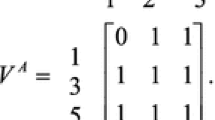Abstract
Fuzzy relation equations and inequalities play an important role in many tools of fuzzy modelling and have been extensively studied. In many practical applications they are used as constraints in optimization. Algorithms for specific objective functions have been proposed by many authors. In this paper we introduce a method to convert a system of fuzzy relation constraints with max-t-norm composition to a linear constraint system by adding integer variables. A numerical example is provided to illustrate the proposed method.
Access this chapter
Tax calculation will be finalised at checkout
Purchases are for personal use only
Similar content being viewed by others
References
Chen, L., Wang, P.P.: Fuzzy relation equations (i): the general and specialized solving algorithms. Soft Comput. 6(6), 428–435 (2002)
Chen, L., Wang, P.P.: Fuzzy relation equations (ii): the branch-point-solutions and the categorized minimal solutions. Soft Comput. 11(1), 33–40 (2007)
Diaz, Y.C., Medina, J.: Multi-adjoint relation equations: definition, properties and solutions using concept lattices. Inf. Sci. 253, 100–109 (2013)
Dubois, D., Prade, H.: New Results about Properties and Semantics of Fuzzy Set-Theoretic Operators. Plenum Press, New York (1986)
Fang, S.-C., Li, G.: Solving fuzzy relation equations with a linear objective function. Fuzzy Sets Syst. 103, 107–113 (1999)
Hirota, K., Pedrycz, W.: Fuzzy relational compression. IEEE Trans. Syst. Man Cybern. B 29(3), 407–415 (1999)
Klir, G.J., Yuan, B.: Fuzzy Sets and Fuzzy Logic: Theory and Applications. Prentice Hall, New Jersey (1995)
Sanchez, E.: Resolution of composite fuzzy relation equations. Inf. Control 30, 38–48 (1976)
Shieh, B.-S.: Minimizing a linear objective function under a fuzzy max-t-norm relation equation constraint. Inf. Sci. 181, 832–841 (2011)
Yang, X.-P., Zhou, G., Cao, B.-Y.: Latticized linear programming subject to max-product fuzzy relation inequalities with application in wireless communication. Inf. Sci. 358, 44–55 (2016)
Author information
Authors and Affiliations
Corresponding author
Editor information
Editors and Affiliations
Rights and permissions
Copyright information
© 2020 Springer Nature Switzerland AG
About this chapter
Cite this chapter
Lama, R., Asmuss, S. (2020). Optimization Under Fuzzy Max-t-Norm Relation Constraints. In: Kóczy, L., Medina-Moreno, J., Ramírez-Poussa, E., Šostak, A. (eds) Computational Intelligence and Mathematics for Tackling Complex Problems. Studies in Computational Intelligence, vol 819. Springer, Cham. https://doi.org/10.1007/978-3-030-16024-1_17
Download citation
DOI: https://doi.org/10.1007/978-3-030-16024-1_17
Published:
Publisher Name: Springer, Cham
Print ISBN: 978-3-030-16023-4
Online ISBN: 978-3-030-16024-1
eBook Packages: Intelligent Technologies and RoboticsIntelligent Technologies and Robotics (R0)




